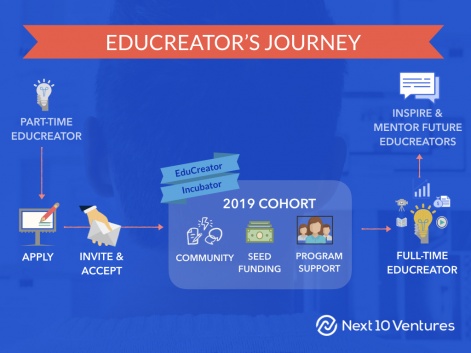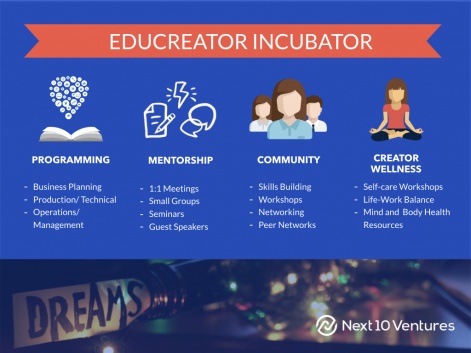This week, Next 10 Ventures revealed EduCreator, an incubation program set up to invest in educational creators and channels.
The incubator program is the first of its kind, and it'll see Next 10 Ventures invest between $25,000 and $75,000 in helping channels evolve, as well as providing programmatic advice and mentorship to help creators turns that investment into sustainable profit.
Over 12 months, the fund will help 25 to 40 creators turn their hobby into a full-time gig, as well as give them the support they need to make their avenues sustainable in the long term.
Next 10 is led by Benjamin Grubbs, an ex-YouTube director. Grubbs played a part in shaping some of YouTube's top partnerships and is now using that expertise to shape waves of creators in other fields, with education being the first and most important stop.
Why focus on educational content?
"A few years ago when I was at YouTube and based in Singapore, I was leading the content partnership team focused on kid's education news. What I saw at the time in that space was a pretty limited base of top creators on the platform producing education and learning content," Grubbs said.
"That was the first time I really took notice of the situation within the creator ecosystem. I then started looking at how more creators could make educational content and how they might be encouraged to do so.
"On the other front, I was seeing a huge demand from consumers for educational content. I'm a father myself and I was seeing how my children were being encouraged to access to educational material online. My mother is a retired teacher and I would hear from her how she was using YouTube videos in the classroom."
Platform diversity
The lack of educational content available online wasn't the only problem. As YouTube grew worldwide, more and more people visited the site but were struggling to find content in their language.
"We looked at the state of that ecosystem in that category and were finding a lack of diversity in two major areas. There wasn't a lot of women making education content, and we thought about how we could encourage more women to pursue educational content as an avenue," said Grubbs.
"The other piece was geographic diversity. YouTube was growing very fast in international markets and that leads to a lot more people coming online and wanting to consume content in their native tongue. Digging deeper, we found that there wasn't a whole lot of this type of content coming from a lot of local languages.
"Since launch, we've had a motivation to dig into the education and learning category and we felt the best way to do this was to launch the incubator and give us a program that has some scale. So we can not just impact one or two creators, but look at impacting a larger number on a global scale."

EduCreator sustainability
The EduCreator application has eligibility criteria, but the parameters are not exclusionary. To qualify, creators must have a minimum of 50,000 followers on a single platform, 750,000 total views on one platform, and an upload history of at least 8 videos in the past year.
"There are minimum subscriber and view thresholds because we want to work with creators that are already producing content online, and give them the financial security they need to be able to take their product and turn it into a full-time venture," Grubbs added.
This isn't just a one-off investment handed out to a group of lucky creators. Next 10 plans to take revenue earned from the growth of their chosen flock and put it back into the fund, so it can help another wave of creators later down the line.
"We have a revenue share set up with the creators we're working with and the intent is to reinvest what we're earning to finance future cohorts. Our aim is to make this sustainable over the long term," Grubbs said.
"We also have a desire to develop other incubators over time. The first sector that we felt strongly about was education content but there are other areas that we feel could benefit from this type of program and structure."
Not just an investment fund
Next 10 Ventures doesn't plan to just give creators a bucket of money and then walk away. The EduCreator incubator will help creators develop multiple avenues of their business. Over 12 months, the team will focus on four pillars:
- Programming
- Mentorship
- Community
- Creator wellness
"We'll be spending a lot of time with chosen creators over the next year to both strengthen what they're doing in those four main areas, and ensure that they're thinking about their revenue streams and how they can sustain them without relying on platform advertising like YouTube," Grubbs explained.
"Additionally, we've been spending a lot of time thinking about how we can have a positive impact in the education field, as well as how online video platforms connect to the field.
"A lot of us have seen the consumer demand for this content first-hand, and we're excited to work with creators in order to strengthen the supply and diversity of content in the educational sector to meet that demand.
"It's not just investment; we want this to be a sustainable project and we don't intend it to be a one-time thing. We're also looking for ways that we can apply the structure that we're developing to refine other areas in the creator ecosystem."














